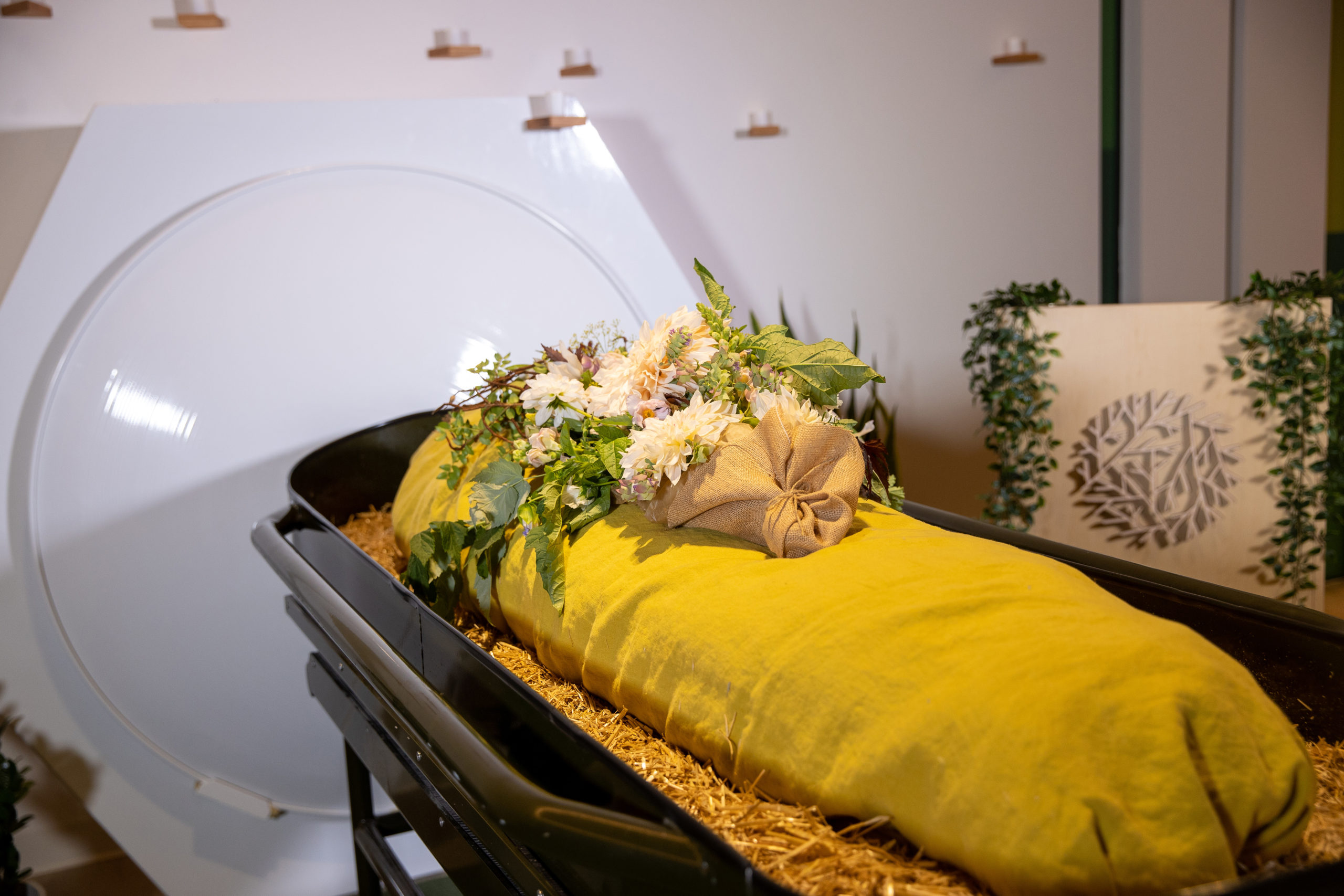Against Fertile Remains
Human composting treats ends as means, and lets us hide from the true nature of our mortality.

New York is the latest state to permit its deceased citizens to become compost. All will be dust, but “Man, you are rutabaga, and to rutabaga you shall return” seems to be the updated translation of Genesis making its way through state legislatures.
Human composting—also known as natural organic reduction—is the practice of enclosing a corpse in a vessel filled with wood chips, alfalfa, and straw for a month. Microbes break down the remains and leave grieving families with soil that can be used for fertilizing trees, flowers, or otherwise digestible plants. Holistic funeral homes such as Colorado’s Natural Funeral frame human composting as a “gentle return to the earth and a conversion of the human body back into a living soil.”
But there are serious problems here. A culture that wants its dead to serve the same purpose as fennel fronds and eggshells is a dying one, because a culture that wants dead bodies to serve a primarily material purpose is a dying one. At death, bodies are separated from their home, an immortal soul, and become a memory of what still is. The matter that used to be continually revitalized is in a state of continual decay: This decay is a sign for the living that the body has served its purpose.
The vision of death offered by human composting is schizophrenic. In one sense, it attempts to prolong the life of the deceased by allowing him to both contribute to his old garden’s ecology and remain in his loved ones’ memory in a physical yet abstract way. But in another sense, it seeks to expedite the time of mourning for the family of the dead by shifting the focus away from past earthly life and eternal soul to present utility.
How does one comfort a friend around the straw, reusable casket of his mother? “Well, at least she’ll be fertilizing her lilacs soon," is not a consoling thought. In a period of six to eight weeks, the hair, nails, skin, and bones of the deceased will have become soil and be scattered. A body that was once a compact unit can no longer be accounted for. It is the same problem that arises when ashes are scattered: The remains of the dead can no longer be thought of as resting in a certain place, but are rather resting somewhere out there. Compost is thrown about every time the soil is tilled or the neighbor’s dog digs a bit while responding to nature’s call.
Retaining remains for composting is not a wholesome crunchy substitute to Big Death and the afterlife industry. On the contrary, human composting is the stale corpse of an inhuman materialism. The compost attempts to extend the value of matter that used to inhabit an eternal soul for limited edition, in memoriam celery stalks. Activists in favor of human composting frequently point to environmental benefits. But the practitioners and proponents succumb to the serious temptation that often arises with bad policy or disordered action: confusing ends and means.
Subscribe Today
Get daily emails in your inbox
"Saving the planet" and "healing the climate" are noble, but notional, goals. We cannot confuse the good end of creating soil health with the bad means of reducing the human body to fertilizer. The ends that green burial undertakers reference to justify their practice—moving away from toxic practices, improving the health of our natural surroundings, and so forth—are good, though largely theoretical, desires. They often use spiritual language in reference to an event that they would also dismiss as a merely physical one, and we certainly can’t blame them for that. But, as the saying goes, the road to hell is paved with good intentions.
We could try to explain away the human composting trend as the logical conclusion of a boomer obsession with planting trees, or another bad trip on neo-transcendentalism. But let us not assure ourselves that any practice will remain rare simply because its early proponents are eccentric. Activists gain cultural support for their niche issues most crucially when the law permits or codifies their practice. The social issues that partially drive elections—abortion, assisted suicide, gay marriage, recreational marijuana, etc.—were first revolutionized at the state level before nationwide acceptance. And so the five states that legalized human composting before New York should come as no surprise: Washington, Colorado, Oregon, Vermont, and California.
In the end, perhaps the most concerning effect—and perhaps the intended one—of human composting will be a continued forgetting of death. Cemeteries serve us the living as much as the dead, for they are a physical reminder of our mortality. There is an underground crypt in the center of Rome whose walls are covered with the skulls and bones of Capuchin friars. A plaque in the chapel reads: “What you are now, we once were; what we are now, you shall be.” If composting helps us forget that, we may be dead a lot longer than we had hoped.